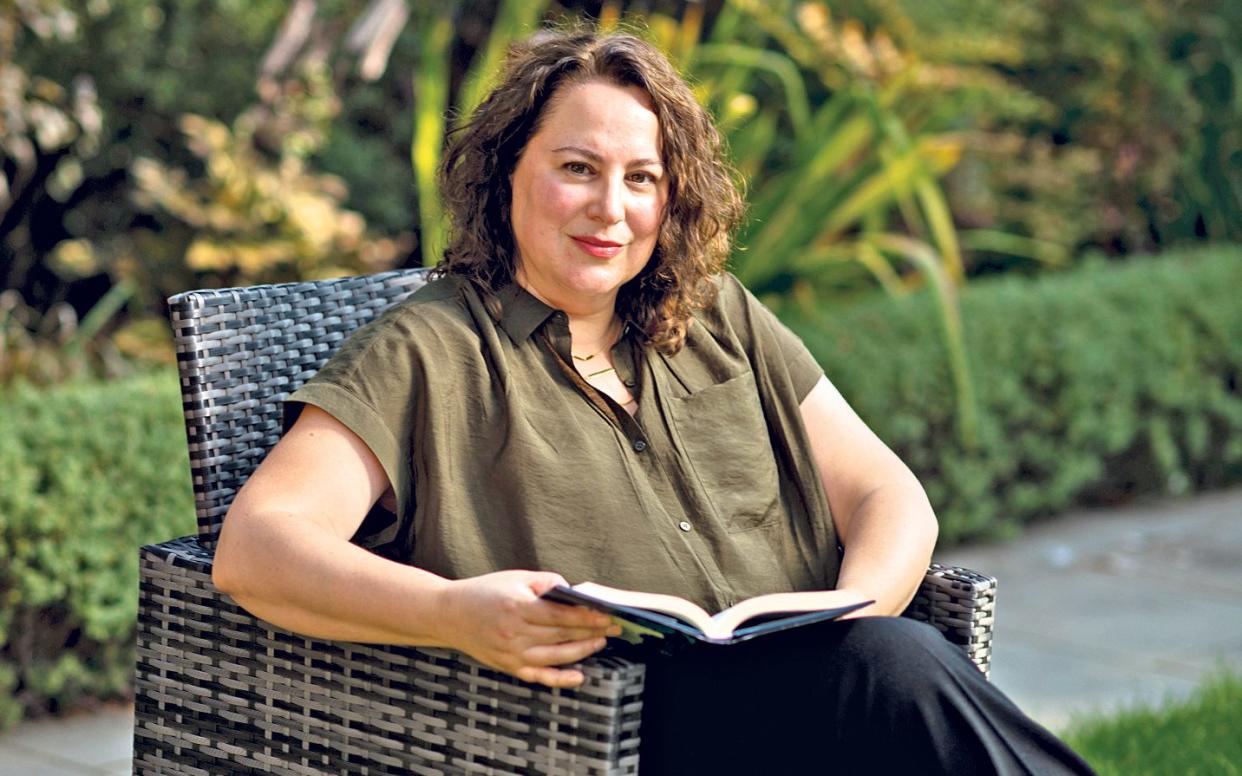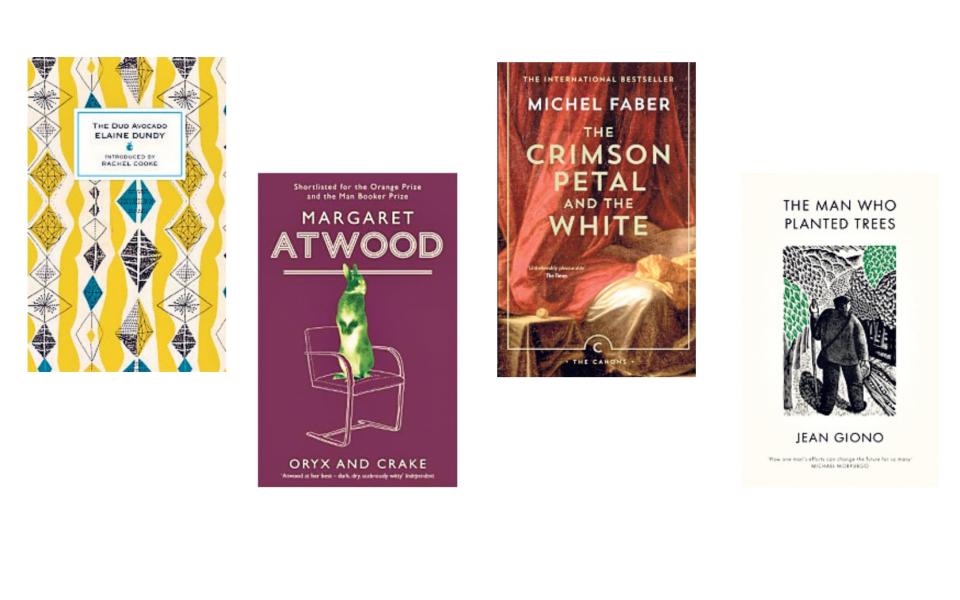How bibliotherapy stopped me from losing the plot over lockdown

I am trying to focus on the welcoming face on the screen in front of me, but my eyes are hungrily scanning the book-lined room behind it; rows upon rows from floor to ceiling. In our Zoom-saturated lives, this is bookshelf nirvana.
A large egg-shaped chair hangs invitingly in the corner ready to cocoon the reader. Nervous and excited, I feel I have nudged open the wardrobe door to Narnia, for I am about to embark on an adventure, a literary journey of self-discovery. My guide is Ella Berthoud, a bibliotherapist.
While book sales and an interest in reading surged during lockdown and beyond, books have been a constant throughout my life, providing this only child with characters infinitely preferable to being winded in the stomach by the boy next door.
Hours were spent gazing in terror at the sinister depictions of Rumpelstiltskin in the Ladybird book. During school holidays, as my grandfather slept in front of the smothering heat of the gas fire, I flitted between the lip gloss-soaked pages of the Sweet Valley High series and the compelling horror of Stephen King.
A generous dollop of sex education came courtesy of Shirley Conran, Jackie Collins and Jilly Cooper. The heat of a Bunsen burner is as nothing compared to your flaming cheeks after your science teacher rips your copy of Conran’s Lace out of your hands and proceeds to read out to the class a passage involving someone getting sexually creative with a goldfish.
Books are my addiction. As the nation stampeded to the reopening pubs, I was bursting through the door of my local bookshop eager to get drunk on words. Books are my refuge when the vagaries of life are too much. Could they help me further?
Even before lockdown, I was feeling a sense of disconnection and loneliness. Minor incidents of unkindness, which I would normally shrug off, felt abrasive. I was fizzing with ideas and a strong desire to connect, but I was at a loss how to channel it.
I had transitioned into a freelance writing career, itself fraught with uncertainties and I was pining for France, a country with which I have a deep connection. Then, like candles being extinguished on a birthday cake, the pleasures of life were snuffed out by the pandemic and the feelings intensified.
This is how I came to Berthoud, who I found via the bibliotherapy offering at self-help website The School of Life. My experience of therapists is that I end up entertaining them, maybe providing some much-needed light relief.
I’m hoping this will be different. Before the online consultation, I’ve already filled out a questionnaire about my book reading habits and the ailments afflicting me, which we discuss in depth.
“Are there any types of fiction that you really don’t enjoy?” Berthoud asks. I feel quite smug as I reply that I am open-minded to all varieties of fiction. “Would you read, for instance, sci-fi or fantasy?” I freeze. Ringing in my head is my family’s taunt that I refuse to read anything that features a dragon, wizard or a UFO.
Berthoud wants to push my literary boundaries and feels that I would gain something from more dystopian, speculative fiction. She has a Margaret Atwood in mind. Relief. “I feel safe in Margaret Atwood’s hands,” I nod sagely, unaware of the ride I’m in for.
Tapping into my desire for connection and my passion for books, Berthoud asks me if I belong to a book club. “Well I did, but I resigned.” A flicker of confusion crosses her face, followed by an arched eyebrow of alarm as I describe how it became more about the ability to hand-roll sushi than opine on a book.
How I have never felt more alienated than the time I was the host and everyone proceeded to discuss a film I had not been invited to. I felt invisible, crumpled by hurt. Ella encourages me to overcome my fear of the words “book club” by starting my own. I mentally file it under “long-term goal”.
A week later, my list of prescribed reading arrives. My dose is 10 books. Under each book is a paragraph comprising a summary and how it might be helpful to me. I’m advised to keep a notebook and write down my thoughts. I decide to go for a fully immersive approach even though I feel guilty for carving out the time for this.
The book I am drawn to select first is the wonderfully titled The Dud Avocado by Elaine Dundy. I am plunged into a hedonistic whirlwind in Paris and the South of France, pulled along by its whip-smart American heroine, Sally Jay Gore (out of the way, Emily In Paris). This is someone I am desperate to drink Pernod with.
Where life has felt so constrained, this was such a liberating read. My next French fix is through The Reader On The 6.27 by Jean-Paul Didierlaurent. A love story at its heart, but also an ode to the power of words. Its quirkily drawn characters hook me in, reminding me of the film Amélie. Both of these books imbue me with a sense of mischief.
Mischief of a much darker variety drags me into the dystopian world of Margaret Atwood’s Oryx and Crake. Although written in 2003, the year of Sars, many passages chill me to the core with their prescience, depicting elements of what we are living through now; a reminder of the fine line between the imagined and the real.
From the gritty reality of this world, I’m transported to 40 alternative versions of an afterlife in Sum by author and neuroscientist David Eagleman. Humour and mind-bending concepts force me to pause after each chapter to reflect on how life is lived in this world.
Apart from my family thinking I am a stand-in for the Booker Prize panel, is my prescription working? I feel like I have been to a spa for the mind. Geoff Dyer’s essays about photography, art and literature in Working the Room provided a cerebral massage. However, his essays on being an only child and his lyricism over a decent cappuccino spoke to my heart. The Secret Life of Bees by Sue Monk Kidd reassured me that you can find your way to the core of something even if you have felt on the periphery.
Although I’m not done yet, I have felt a profound shift. From feeling depleted, I feel enriched. You may argue that reading is not really living, but we’re all living half-lives at the moment. I’m putting back what has been stripped away. Travel is curtailed, but I’m on one of the best journeys of my life.
My bibliotherapy prescription

The Dud Avocado
Elaine Dundy
For a highly likeable and amusing narrator, who throws herself into Parisian life. A cult classic to reconnect me with France and feed my love of sharp observational humour.
The Reader on the 6.27 Jean-Paul
Didierlaurent
A book full of quirky characters that appeals to the Francophile in me. A novel very much about connection with others, a prime concern of mine.
Oryx and Crake
Margaret Atwood
To push me into the area of speculative, dystopian fiction. Shocking and darkly humorous with much to say on the pharmaceutical and beauty industries. A book to galvanise me.
Sum
David Eagleman
A book to expand the mind with its concept of 40 imagined afterlives. Thought-provoking and life-affirming with the dose of humour I enjoy. To help me appreciate the here and now rather than agonising about the “what-ifs”.
Working the Room
Geoff Dyer
Owing to my love of sharp, humorous essays from writers such as David Sedaris and A A Gill, this series of essays is to feed my intellectual curiosity and to entertain. Also, to inspire me in my own writing.
The Secret Life of Bees
Sue Monk Kidd
For someone like me, who feels things keenly, a book about empathy, inclusivity in its various forms and finding your place.
The Guide
R K Narayan
A book to help me feel optimistic and refreshed and a book to ponder on the directions we take in life, whether we choose them consciously or not.
The Man Who Planted Trees
Jean Giono
An uplifting book to calm the endless chatter in my head. One man slowly and patiently regenerating the land as events happen around him. Also prompts reflection on the world and the difference you can make as an individual.
Becoming Dinah
Kit de Waal
Ostensibly a coming-of-age novel, this is a book about reinventing yourself and accepting yourself, which ties in with my own career transitions and following my own path.
The Crimson Petal and the White
Michel Faber
A vivid and gritty book set in the 19th century to help me escape into a completely different world. To cement my love of language and writing.
Avid reader? Join the Telegraph's virtual book club where we discuss some of our favourite reads, old and new at telegraph.co.uk/telegraphbookclub

